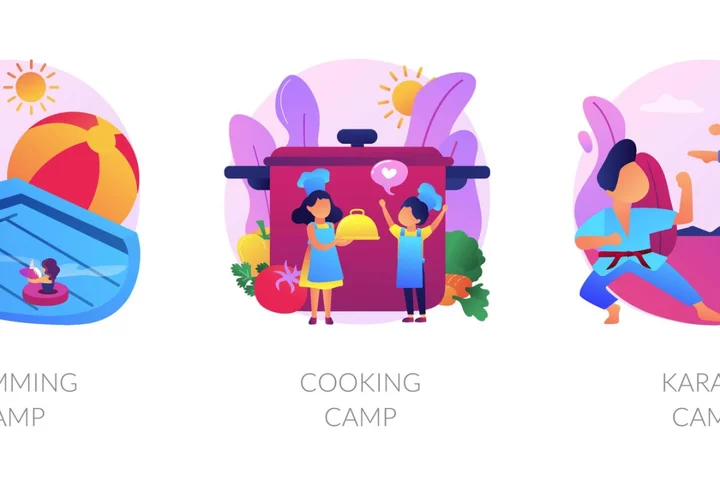
8 budget-friendly ways to juggle childcare and work during holidays
Idyllic images of happy children playing in sunny gardens during the summer holidays aren’t so easy to turn into a reality when you’re a working parent. Instead of wondering how full to fill the paddling pool, working mums and dads are more likely to be doing their sums about paying for the childcare they need so they can work as their kids enjoy the summer holidays. Emily Pritty, joint head of legal advice service at the charity Working Families, points out that its recent research found four in 10 low-income families have gone into debt to pay for childcare, nearly half have had to reduce their hours, and a fifth have even quit their job to manage childcare. “The summer holidays are a source of stress and anxiety for many working families whose work situation doesn’t allow them any flexibility to manage childcare and who can’t afford the additional childcare costs,” she says. “School holidays are the pinch point for so many working families with school-aged children, as the usual pattern of caring and routine changes, and the demands of work don’t reflect this.” But there are ways to make summer childcare more affordable for the UK’s 17.5 million working parents and carers, says Sabine Kobayter, chief marketing officer at Pebble, which connects parents with childcare and activity providers. “The summer holidays can be really hard for parents who are trying to juggle work and childcare – while also trying to feed hungry minds with activities that will stimulate children,” she says. “There’s a huge variance in the cost of finding childcare, and trips out as a family can quickly add up. The good news is there are many solutions to help find affordable ways to keep children entertained whilst spinning work plates too.” Here are budget-friendly summer childcare solutions suggested by Kobayter and Pritty… 1. Use holiday camps From sports camps to street dance, drama, academic and cookery, holiday camps start from £16.50 per day, says Kobayter. “Holiday camps are great as they often mirror the working day, and children can find camps that match their hobbies and interests,” she says, explaining that as holiday camps increase in popularity, the trick to getting a space is to book your child’s slot as early as possible. “This also allows you to plan your work schedule with the peace of mind knowing your children are being cared for, while doing something they love, and meeting new friends.” 2. Take paid or unpaid leave Many parents will have to use their annual leave to look after their kids over the summer, and if they don’t have enough left, unpaid leave is a statutory option, says Pritty. “The burden of taking unpaid time off does tend to fall more heavily on women due to the gender pay gap, as for family finances, often the decision is for the parent on the lower income to take the leave.” 3. Stretch out free childcare You’re entitled to 30 hours of free childcare in England, and Pritty suggests: “You could stretch your entitlement so you receive fewer hours each week but get the childcare during school holidays too.” Check whether your childcare provider will allow you to do this. 4. Get friends and family to help Many parents rely on informal networks of friends and family to help cover the gaps in caring throughout the year, and Pritty says: “This is particularly prevalent in school holidays, given the cost of holiday clubs and formal childcare. Parents often group together with friends to cover particular days and then reciprocate in a shared care arrangement.” 5. Use free kids’ activities “Not everything costs,” promises Kobayter, who suggests that if parents use annual paid/unpaid leave, or get friends and family to help with childcare, they keep subsequent costs down by searching for free activities local to them, and lock in days out as a family. “Museums, national parks, events in local parks – there’s a surprising amount available,” she says. 6. Try ad-hoc childcare Until recently, childcare needed to be locked in months, sometimes even years, in advance, says Kobayter, but now childminders and childcare providers are starting to enable ad-hoc bookings for parents in need. “As work becomes more flexible, childcare needs to as well,” she observes. “If you have a last-minute need to book childcare, all is not lost.” Pritty says the Family and Childcare Trust can provide details about your local Family Information Service, which will in turn be able to tell you about available summer childcare including childminders, nurseries, out of school clubs and any holiday schemes running in your local area. 7. Use vouchers if possible Childcare vouchers, tax-free childcare and the childcare elements of working tax credit and universal credit can all be used in holiday clubs, if the childcare is registered or approved, says Pritty, although she warns that not all childcare providers accept vouchers and they need to be signed up to tax-free childcare. You can check the types of childcare that you can get help with. 8. Check you’re getting the right financial help Pritty suggests parents check they’re getting the childcare support they are entitled to, by using this online calculator if necessary.
1970-01-01 08:00
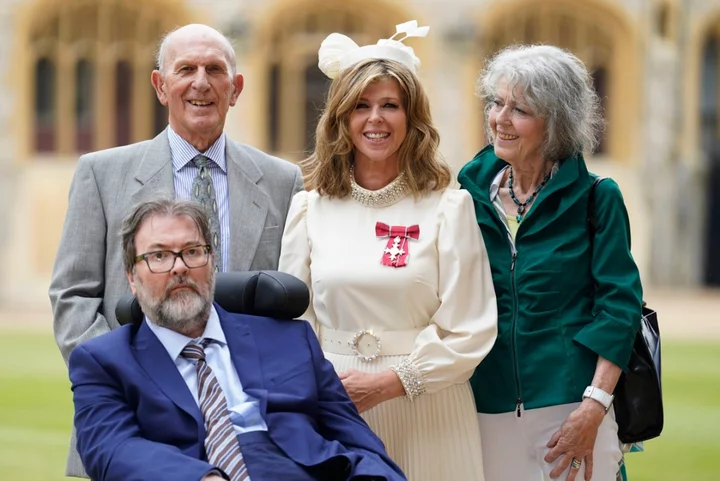
Kate Garraway’s husband Derek Draper admitted to hospital after MBE ceremony
Kate Garraway’s husband Derek Draper was admitted to hospital after she was awarded an MBE last week, the presenter has revealed. The Good Morning Britain host, 56, reflected on the “extraordinary day” she met the Prince of Wales at Windsor Castle with Draper watching from close by. Garraway, who was awarded the MBE for her services to broadcasting, journalism and charity, recounted an eventful week that “started with Derek in hospital and ended with Derek in hospital”. Draper, who is a former political advisor and author, contracted Covid-19 in March 2020, became critically ill and was put into a medically-induced coma. He still receives 24-hour care at home and is frequently in and out of hospital for treatments. “It was so wonderful to see Derek’s determination to be there, so kind of the Prince of Wales, to make it special for him & to recognise the work of Jake our incredible carer, who represents all those who make Derek’s daily life possible,” Garraway wrote in an Instagram post that was shared on Sunday (2 July). “Tomorrow Derek is back in hospital and of course the daily struggles go on – but the fact that he was able to be part of Wednesday is to be treasured & can’t thank everyone in the @NHS and all around him who love him for making it possible.” The couple have been married since 2005 and share two children, Darcey and Billy. Previously, Garraway spoke candidly about the reality of caring for her husband and said she has felt “frustrated, depressed and emotional” since he fell ill. The TV presenter became a full-time carer for Draper, alongside medical professionals. At the MBE ceremony, Garraway revealed that Draper “burst into tears” as she was awarded the honour by Prince William, who turned to wave at him as the former political advisor watched from his wheelchair. Garraway said: “Ah, I know, Derek burst into tears. The Prince of Wales said, ‘How’s Derek?’ and I said, ‘He’s here’. “[William] said he wants to go over [to Draper] but he’s not allowed to leave the rug, there’s a very fancy gold carpet that he stands on. “So we turned and saw and then obviously Derek was very tearful and then spoke about Jake [Draper’s carer] and gave Jake a wave as well,” she continued. Garraway has made two documentaries, Finding Derek and Caring For Derek, about her family’s journey navigating Draper’s illness. Both programmes won National Television Awards in the authored documentary category. Read More Plans for Prince Andrew to move into Harry and Meghan’s former home ‘quietly shelved’ Jo Lindner death: YouTube bodybuilding star known as Joesthetics ‘dies from aneurysm’, aged 30 Stanley Tucci recalls trying to break up with wife Felicity Blunt over 21-year age gap Kate Garraway reveals Prince William asked after Derek Draper while awarding her MBE Kate Garraway made MBE by Prince William with Derek Draper’s support Affected by someone else’s drinking? 3 key pieces of advice for loved ones of alcoholics
1970-01-01 08:00
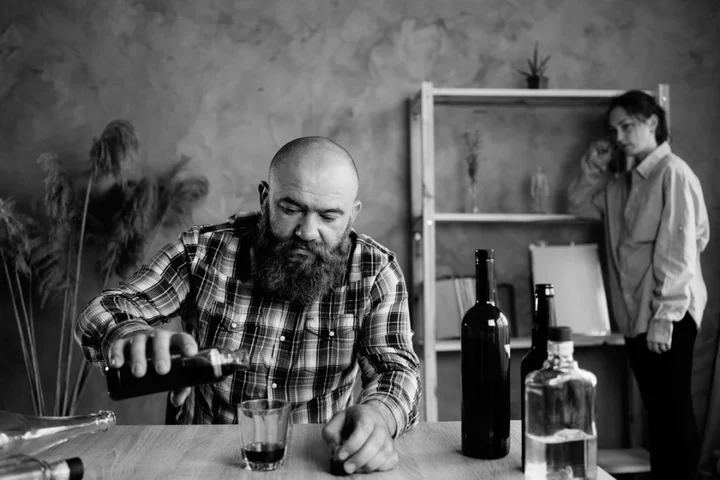
Affected by someone else’s drinking? 3 key pieces of advice for loved ones of alcoholics
Is there an alcoholic in your life? We don’t often talk about the people whose lives have been affected by someone else’s drinking – but the impact on loved ones, family and partners can be immense. For Alcohol Change UK – the charity behind Alcohol Awareness Week (July 3-9) – it is important that loved ones of alcoholics know they are not alone. According to a new survey commissioned by the charity – which is not anti-alcohol but working towards ‘alcohol change’ and to reduce the harm it causes – some 19% of drinkers consider alcohol to be an “essential” in their shopping basket, with 15% of people worried about the amount of alcohol someone in their household has been drinking. “Far too many lives are tragically cut short each year due to alcohol, with the latest figures on the number of alcohol-specific deaths at a record high. At the moment, 600,000 people in the UK could benefit from alcohol treatment but the vast majority are not receiving it,” said Andrew Misell, Director for Wales at Alcohol Change UK. “It can be heart-breaking to see someone close to you struggle with alcohol problems. But it is not only the drinker who is affected – their loved ones can feel the effects too. The pressures of caring for someone who is drinking heavily can be overwhelming,” Misell adds. “But by encouraging them to seek support, you can really improve their health and yours.” Is somebody close to you an alcoholic? Here are some key pieces of advice that may be helpful… Visit your GP Seeing your GP could help you address any anxiety you may be grappling with. They can offer professional and nuanced advice that will help you communicate how you really feel to a loved one who needs to stop drinking, and steer you towards your own mental health support if necessary. “Living with someone who is struggling with an alcohol problem can be exhausting. You will want to do the best you can for your loved one, but your relationship with them is bound to be strained. You may no longer feel able to trust them,” Misell said. “They may well be neglecting family duties, and their moods may swing erratically. It’s important you find some time and space for yourself and for your own concerns and interests.” Also, anyone is allowed to contact the GP or safeguarding anonymously if, for instance, there is a parent with alcoholism looking after young children. Reach out to family support services Whatever your relationship with the person with an alcohol problem, other people will have had, or be having, similar experiences. Connecting with them at one of the many family support services across the country can be really helpful. “It may be worth you seeking out support from a families’ organisation like Adfam or Al-Anon, where you’ll be able to connect with others who are in the same boat as you,” Misell said. Bottled Up, meanwhile, offers information and advice for family members living with someone who is alcohol-dependent. The founders of the organisation are a therapist and a psychologist who have direct experience with alcoholism. Al-Anon provides free meetings where the family and friends of alcoholics can listen to the shared experiences of those in a similar positions. Al-Anon also has a separate arm for children aged between 12-17 called Alateen, where teenagers can share their experiences and find support, while also learning about the nature of the illness. Think about the four aspects of their health Before sitting down to talk about what is going on with a family member who is drinking too much, it might be a good idea to be prepared about what you need to say. This could be a helpful step in deciding what actions to take in order to seek help, too. Dr Niall Campbell, Priory consultant psychiatrist and addictions expert, based at Priory Hospital in Roehampton, southwest London, suggests thinking about these four aspects of their health first: physical health, mental health, relationship health and their work health. “Are they falling over? Have they injured themselves? Have they been drinking to the point of amnesia? Blackouts? Are they hungover and sick in the morning? Have they gone to see their GP? Some results, such as high blood pressure, could be a good indicator,” Campbell said. “And then mentally, is it making them depressed? Are they irritable? Do they seem ashamed or guilty? Is their drinking adversely affecting relationships between a husband and wives, siblings, children, and parents? “When it comes to their work, are they missing it? Are they late going into the office and saying they can’t do their job properly because they’re drinking at home? This is a big problem since the lockdown.” He suggests doing this with a third party that’s already aware of the situation, so you can pull together more concrete examples. Read More Charity boss speaks out over ‘traumatic’ encounter with royal aide Ukraine war’s heaviest fight rages in east - follow live The history of royal fashion at Wimbledon How to be waterwise in your garden this summer Every Barbie-inspired outfit Margot Robbie has worn so far
1970-01-01 08:00

Jo Lindner death: YouTube bodybuilding star known as Joesthetics ‘dies from aneurysm’, aged 30
German bodybuilder Jo Lindner, known online has Joesthetics, has died from an aneurysm in Thailand, aged 30. The news was confirmed by the fitness influencer’s girlfriend Nicha on Saturday (1 July). Posting pictures of herself with Lindner on her Instagram feed, Nicha paid tribute to the YouTuber she desribed as sweet, kind, and hardworking. “And he is the believer in EVERYONE,” she continued. “specially [sic] ME he believes in me that I could be better and be someone in this world.” Lindner had 8.4 million Instagram followers, and his YouTube videos reportedly earned nearly 500 million views. Nicha said Lindner suffered an aneurysm after complaining of pain in his neck earlier this week. She also said she was with him when he died. An aneurysm is an abnormal swelling or bulge in the wall of a blood vessel. “[The] Last word he said [to me]: ‘Bae we all always can start again and that is the key. always keep start [sic] again,” she later wrote on her Instagram Stories. Subsequently, Nicha appeared to address speculation around Lindner’s cause of death, writing it’s unfair to her partner that people “guess how he die [sic] or say he overdose”. She added that if Lindner was “brave enough” to admit he used steroids, there was no reason not to believe him. In an interview with fellow bodybuilder Bradley Martyn last month, Lindner spoke about being diagnosed with rippling muscle disease, a rare genetic condition that causes muscles to become unsually sensitive to movement or pressure. According to the Genetic and Rare Diseases Information Center (GARD), the disorder is characterised by “signs of increased muscle irritability” such as repetitive tensing of the muscle, “bunching up” of the muscle, and/or prominent rippling. “Technically, it’s a cramp,” Lindner told Martyn, during an episode of the latter’s Raw Talk show. After news of Lindner’s death broke, fellow bodybuilder Noel Deyzel confirmed the reports were true on his Instagram Stories. “This is not a joke. His mother requested that we inform people about the situation,” he wrote. “Please keep Jo and his loved ones in your prayers. “I still just can’t f***ing believe it. Rest in peace brother.” Another one of Lindner’s friends, known as Vigorous Steve, posted a YouTube video shortly after his death, explaining that the cause of death reports were based on preliminary findings. “We’re still waiting for the autopsy reports,” he added. Read More Kevin Costner’s estranged wife says she’ll move out of their $145m home on one condition Nutritionist explains how women can eat to help balance hormones Colleen Ballinger: Everything we know about the ‘grooming’ allegations against YouTuber Miranda Sings Mick Jagger reps deny singer is engaged at 79: ‘Ill-informed gossip’ Kate ‘pushed for key phrase’ in palace response to Harry and Meghan’s Oprah interview
1970-01-01 08:00

Louis Tomlinson’s sister, 19, reflects on ‘cruel’ backlash to being a ‘young mama’
Louis Tomlinson’s 19-year-old sister has reflected on the negative comments and criticism she received after announcing her pregnancy earlier this month. On 19 June, Phoebe Tomlinson revealed that she and her boyfriend, footballer Jack Varley, 26, are expecting their first child together. The couple said their firstborn is a boy, sharing the news in a gender reveal video posted on Instagram 10 days later. In the video, Varley pops a black balloon filled with blue confetti, before hugging Phoebe as they celebrate the news with friends and family. The model and mum-to-be later answered fan questions about her pregnancy journey on her Instagram stories, including whether she had dealt with any backlash for being a “young mama”. Phoebe replied: “Any nasty comments will get removed and blocked, so I just try and let them go over my head. That’s the downside of social media. And I’ve truly learnt in the past few weeks how incredibly cruel people can be. “I’m lucky I have an amazing family,” she added. Her twin sister Daisy left lots of blue heart emojis on Phoebe and Varley’s gender reveal video, while their older sister Lottie Tomlinson, 24, said she “can’t wait to meet” her nephew. Phoebe also responded to a 19-year-old fan who also “wanted a baby early in life but people were against it”. She said: “Why do ‘people’ matter? It’s your life, sweets.” Phoebe also shared she “feels like any other expecting mum” when asked if it was scary to become a mother at “such a young age”. Elsewhere, she said her brother Louis was “excited” to find out Phoebe and Varley were having a boy. While the former One Direction star wasn’t at the gender reveal, Phoebe told a fan she texted him a few days prior to the announcement. She also expressed her excitement at her baby meeting Daisy, and told a fan she becomes “emotional” when she thinks about Varley becoming a father. “I can’t wait to see them snuggle and to watch him thrive as a dad,” she added. Finally, Phoebe said that she felt her late mother Johannah Deakin “guiding us through” the pregnancy. Deakin died from leukemia in December 2016, aged 43. The family was dealt another tragic blow in March 2019, when the siblings lost their sister Félicité Tomlinson after she died from an accidental drug overdose, aged 18. Read More Kevin Costner’s estranged wife says she’ll move out of their $145m home on one condition Colleen Ballinger: Everything we know about the ‘grooming’ allegations against YouTuber Miranda Sings Sarah Jessica Parker reveals she and husband Matthew Broderick haven’t ‘spent a night apart’ in 31 years Ellie Simmonds decided to find her birth mother as she starts ‘new chapter’ with partner Matt Dean Nutritionist explains how women can eat to help balance hormones
1970-01-01 08:00

These high street iced coffees contain more sugar than Coca-Cola, Which? says
Some iced coffee drinks from high street chains can contain more sugar than a can of Coca-Cola, which contains 35g of sugar, a survey has found. Which? compared frappes and frappucinos from Caffe Nero, Costa and Starbucks to find many had “exceptionally high” amounts of sugar. A Starbucks caramel frappuccino with semi-skimmed milk was found to be one of the worst offenders, containing 48.5g of sugar – or 12 teaspoons’ worth. NHS health advice suggests adults consume a maximum of 30g of sugar per day, or around seven teaspoons. A Caffe Nero Belgian chocolate and hazelnut frappe creme contained 44.5g of sugar – equivalent to 11 teaspoons. At Costa, a chocolate fudge brownie frappe mocha with oat milk included 42.6g of sugar, or 10.5 teaspoons. Which? compared the amount of sugar in these drinks to a 51g Mars bar, which contains 31g of sugar (7.5 teaspoons), while a 330ml can of Coca-Cola contains 35g of sugar (around 8.5 teaspoons). Even plain coffee flavour frappes and frappuccinos were found to contain “relatively high” amounts of sugar. A Costa Coffee frappe with skimmed milk contained 21.3g of sugar, Which? found. While the calorie content of the drinks must be displayed in stores, the sugar content does not, which could leave consumers at risk of unwittingly exceeding the maximum recommended daily intake of free sugars, the watchdog said. Dairy-based drinks derive some “locked in” sugar from lactose, but all the drinks also contained high amounts of “free sugars”, which refers to sugars that have been added and contained in syrups, honey and fruit juice. Health advice is to limit consumption of these sugars due to their potential to contribute to weight gain and tooth damage. Which? suggested consumers wishing to cut their sugar intake switch to iced versions of a standard coffee instead. The government introduced a Soft Drinks Industry Levy (SDIL) in 2018, known as the “sugar tax”, in an attempt to cut unhealthy levels of consumption. However, some drinks are exempt from the tax, including fruit juices and drinks made on-site and served in open cups. Syrups, often used in frappes, are also exempt. Which? nutritionist Shefalee Loth said: “Our analysis of sugar content in iced coffee blends shows people could unwittingly be consuming much more sugar than they realise, with potentially damaging implications for their health. “High street chains need to take more responsibility and reduce the excessive sugar content of some of their drinks to protect people’s health. “When buying an iced drink, there are alternative, healthier options to choose, such as a standard iced coffee, which contains far less sugar.” A Starbucks spokesperson said: “We are committed to helping customers make informed and improved choices that work for them, offering a range of customisation options such as choosing our smallest size (Tall) and our oat dairy alternative with no added sugar. “Sugar content for an Iced Latte with Semi Skimmed Milk, one of our most popular beverages, starts from 8.7g for a Tall size. Customers can find all nutritional information available on our mobile app, online and our menu boards.” Caffe Nero described its Belgian chocolate and hazelnut frappe creme as a “treat” and said it accounted for less than 5 per cent of its sales of summer drinks, while “coffee over ice” drinks, which contained less than 8g of sugar, accounted for 50 per cent of summer drink sales. The chain added that its iced latte – its highest seller – contained no added sugar. Reporting by PA Read More Olivia Colman’s fight to end domestic abuse: ‘Women are still expendable’ Colleen Ballinger: Everything we know about the ‘grooming’ allegations against YouTuber Miranda Sings Kevin Costner’s estranged wife says she’ll move out of their $145m home on one condition Starbucks barista documents coffee chain’s alleged food waste in viral video Being lonely ‘may increase risk of heart disease in diabetes patients’ Sarcoma Awareness Month: What you need to know about these cancers
1970-01-01 08:00
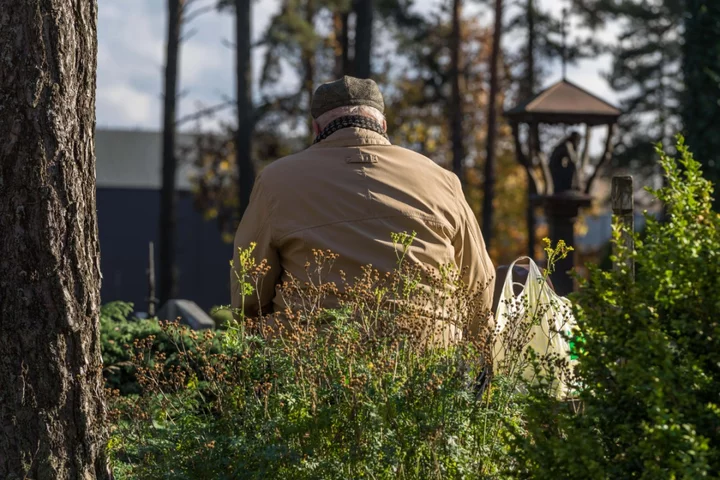
Being lonely ‘may increase risk of heart disease in diabetes patients’
Being lonely may the increase risk of heart disease in diabetes patients, research suggests. Scientists have found loneliness to be a bigger risk factor for coronary heart disease – a condition where the blood vessels supplying the heart are narrowed or blocked – than diet, exercise, smoking and depression. The researchers said their findings, published in the European Heart Journal, highlight the importance of meaningful social relationships to stay healthy. Study author Professor Lu Qi, of Tulane University School of Public Health and Tropical Medicine in New Orleans, said: “The quality of social contact appears to be more important for heart health in people with diabetes than the number of engagements “We should not downplay the important of loneliness on physical and emotional health. “I would encourage patients with diabetes who feel lonely to join a group or class and try to make friends with people who have shared interests.” For the study, the researchers looked at data from the UK Biobank – an online database of medical and lifestyle records from more than half a million Britons – involving more than 18,000 adults aged between 37 to 73. These people had diabetes but no heart disease at the start of the decade-long study. The researchers used questionnaires to assess loneliness and other factors that may affect relationships such as body mass index (BMI), physical activity, diet, alcohol, smoking, and medications, blood pressure, cholesterol and control of blood sugar. The findings suggest that asking patients with diabetes about loneliness should become part of standard assessment, with referral of those affected to mental health services Prof Lu Qi Over the course of more than 10 years, more than 3,000 people developed heart disease, which included coronary heart disease or stroke. The researchers found those who scored the highest in loneliness had a 26% greater risk of heart disease, compared to people with lower scores. The team also found loneliness to be a bigger risk factor for heart disease than diet, exercise, smoking and depression – but showed a weaker influence when compared to kidney function, cholesterol and BMI. Professor Qi said: “Loneliness ranked higher as a predisposing factor for cardiovascular disease than several lifestyle habits. “We also found that for patients with diabetes, the consequence of physical risk factors (ie poorly controlled blood sugar, high blood pressure, high cholesterol, smoking and poor kidney function) was greater in those who were lonely compared to those who were not.” “The findings suggest that asking patients with diabetes about loneliness should become part of standard assessment, with referral of those affected to mental health services.” Read More Charity boss speaks out over ‘traumatic’ encounter with royal aide Ukraine war’s heaviest fight rages in east - follow live 7 ways to save money on your hair Sarcoma Awareness Month: What you need to know about these cancers Bjork’s controversial swan dress to go on display in new exhibition
1970-01-01 08:00

Sarcoma Awareness Month: What you need to know about these cancers
Although most people have heard of sarcomas, research suggests the majority don’t really know what they are. A study by Sarcoma UK found 75% of people didn’t know what a sarcoma was – but there’s no better time than July’s Sarcoma Awareness Month to learn. Sarcomas are rare cancers that can either form in the bones or soft tissues that connect, support and surround other body structures and organs, explains Sarcoma UK. “If you’ve never heard of sarcoma before, you’re not alone,” says Dr Sorrel Bickley, director of research, policy and support at Sarcoma UK. “Sarcoma can affect any part of the body, on the inside or outside, including the muscle, bone, tendons, blood vessels and fatty tissues.” She says around 15 people are diagnosed with sarcoma cancer every day in the UK, and stresses: “It can affect anyone, at any age, and it’s vital that healthcare professionals can recognise its signs and symptoms.” During Sarcoma Awareness Month the charity is running a campaign called Does Size Matter?, in a bid to draw attention to the fact that a lump getting bigger is a key sign of sarcoma. “Most lumps and pains won’t be sarcomas, but it’s important to keep an eye on symptoms and to seek medical help if you’re worried,” stresses Bickley, who explains that many patients tell the charity it’s taken a long time for them to get a correct diagnosis. She adds: “Many people don’t consider their symptoms might be serious. Delays cost lives, and people have a better chance of surviving sarcoma if their cancer is diagnosed early. ” There are around 100 different subtypes of sarcoma, grouped into soft tissue sarcomas and bone sarcomas, and Bickley explains: “Soft tissue sarcomas may not have obvious symptoms in the early stages when the tumour is very small. The symptoms can become more obvious as the sarcoma grows, but this can depend on where in the body it’s found. ” She says there are several main sarcoma symptoms to be aware of… A lump that grows or changes Bickley says sarcoma is a “complicated cancer”, but the most common symptom is a lump, which could be anywhere on the body – including the arm or leg. “Most lumps aren’t harmful and a lump that isn’t getting bigger, isn’t causing any pain, or that has been there for a long time isn’t likely to be anything to worry about,” she says. “But if it’s growing quicky or measures more than five centimetres – about the size of a golf ball – then you should get it checked by your GP.” Swelling or pain in or around a bone Sarcoma cancer can also start in a bone – the most common symptoms are unexplained pain or tenderness around a bone, which may come and go and may be worse at night, explains Bickley. “If the pain is getting worse and doesn’t go away with rest or at night, you should go and see your GP to get it checked,” she advises. Stomach pain, feeling sick and loss of appetite Some forms of sarcoma – known as a gastrointestinal stromal tumours, or GISTs – can start in the gastrointestinal tract. “With this type of sarcoma, people most often experience symptoms like fatigue, anaemia, weight loss, feeling sick or discomfort around their stomach,” Bickley says. Blood in poo or vomit Noticing blood in your poo or vomit can also be a sign of a gastrointestinal stromal tumour, says Bickley, who adds: “There are lots of causes for blood in poo or vomit, but it needs to be checked by a medical professional.” For more information or advice about sarcoma, call the Sarcoma UK support line on 0808 801 0401, email supportline@sarcoma.org.uk, or text 07860 058830 to contact a specialist adviser. Read More Charity boss speaks out over ‘traumatic’ encounter with royal aide Ukraine war’s heaviest fight rages in east - follow live Bjork’s controversial swan dress to go on display in new exhibition Chrissy Teigen welcomes fourth child – how does surrogacy actually work? 11 ways to work the colour clash trend at home
1970-01-01 08:00

Influencer Tammy Hembrow angers fans by tanning in bikini weeks after having skin cancer removed
A popular fitness influencer has angered fans after posting photos of herself tanning in the sun just weeks after revealing she’d had a skin cancer lesion removed from her leg. Earlier this month, Tammy Hembrow, an Australian-based YouTuber, issued a reminder to her followers about the importance of annual skin cancer screenings in a video posted to TikTok. In the video, the 29-year-old revealed that she’d recently had a “chunk” of her leg removed after doctors identified melanoma, the deadliest form of skin cancer. “Okay so I want to show you guys the chunk they had to take out of my leg because of the melanoma that I have,” Hembrow began the video, before explaining that the week earlier she’d had to get a “skin cancer cut out of my leg”. “It was melanoma, which spreads very quickly and is very dangerous [and] can be very deadly if it spreads,” Hembrow continued, while noting that the mole in question had been “tiny” and “did not look suspicious to [her] at ALL”. In the video, Hembrow informed her followers that she was waiting for confirmation from her doctor that they’d “got it all,” with the influencer noting that she was “very hopeful that they did”. Hembrow then expressed her relief that she’d gotten a skin cancer screening, before urging her fans to “get regular skin checks”.“I am so so so lucky that I went and got my skin checked. Please get regular skin checks, it can honestly be life-saving,” she continued. In the TikTok, the influencer then admitted that, despite spending a lot of time in the sun, she rarely wears sunscreen. However, she said she is “absolutely regretting that now,” as she revealed that the skin cancer scare has “changed [her] outlook on everything”. @tammyhembrow Go book that skin check rn guys ? ♬ original sound - Tammy Hembrow According to the Mayo Clinic, melanoma, the most serious type of skin cancer, “develops in the cells that produce melanin, the pigment that gives your skin its colour”. “Exposure to ultraviolet radiation (UV) radiation from sunlight or tanning lamps and beds increases your risk of developing melanoma,” the health organisation states, while noting that melanomas “most often develop in areas that have had exposure to the sun, such as your back, legs, arms and face”. After revealing that she never thought she’d develop melanoma, and admitting that she felt “very silly for that now,” Hembrow showed her followers the two-inch stitched incision behind her knee where the melanoma had been removed. Hembrow is now facing anger and concern from her fans, just weeks after sharing the skin cancer warning, after posting photos of herself tanning in the sun. In the pictures, which the influencer posted to Instagram on Tuesday, she could be seen wearing a patterned yellow bikini as she posed on a sun lounger while sitting outside in the sun. In the photos, Hembrow could also be seen wearing the bandage on her leg where the melanoma lesion had been removed. “OMG, you just had a melanoma removed and are sunbathing,” one person commented under the photos, while another said: “You’re another type of thick if you’re sunbathing after just having a melanoma removed.” “Literally still has the bandage on from having a melanoma removed and now posting photos of herself suntanning. It’s like she wants to get skin cancer?” someone else wrote. However, Hembrow has since defended herself from the backlash in the comments, where she claimed that she was “in the sun for 15 minutes” and that it’s “silly” to think she can “never go in the sun in a bikini again”. “Was in the sun for 15 minutes. It’s also winter here and I don’t go in the sun without sunscreen anymore,” Hembrow wrote in response to one critic. “Alsooo, I am still very much going to go in the sun, to the beach, to the pool, or even if I just want to read a book for 15 minutes in the sun etc. “Just always going to wear SPF and not be out in the hottest hours with no protection like I used to. People are silly if they think I can never go in the sun in a bikini again…” According to The Skin Cancer Foundation, regular daily use of SPF 15 sunscreen can “reduce your risk of developing squamous cell carcinoma (SCC) by about 40 per cent, and lower your melanoma risk by 50 per cent”. However, skin cancer charity Cancer Research UK notes that individuals who have been diagnosed with melanoma are at a higher than average risk of developing the skin cancer again in the future. The Independent has contacted Hembrow for comment. Read More Sarah Ferguson reveals she almost skipped doctor’s appointment that led to cancer diagnosis Best sunscreen for your face 2023: Daily SPF protection, from sensitive to non-greasy formulas Khloe Kardashian says what she thought was a zit turned out to be melanoma
1970-01-01 08:00

Pete Davidson reportedly enters rehab amid mental health struggles
Pete Davidson has reportedly checked into a rehabilitation center amid ongoing struggles with his mental health. The Saturday Night Live alum, 29, is receiving treatment for his previously diagnosed borderline personality disorder and post-traumatic stress disorder, Page Six initially reported. According to People, sources said Davidson “should be getting out” of the in-patient treatment center “pretty soon”. “Pete will often check himself into rehab to work on these issues,” another source told the outlet. “His friends and family have been supportive during this time.” Davidson has previously been open about his mental health struggles. In 2017, the King of Staten Island actor shared he had been diagnosed with borderline personality disorder (BPD) during an appearance on the WTF With Marc Maron podcast. He explained that he had checked into a rehabilitation center in December 2016 after struggling with symptoms of the disorder. “I started having these mental breakdowns where I would, like, freak out and then not remember what happened after. Blind rage,” the comedian said, noting that he originally thought smoking weed caused his extreme mood swings. He stopped smoking weed and entered rehab, though he resumed the habit and soon had a “really bad mental breakdown”. Davidson was eventually diagnosed with BPD several months later. “I found out I have BPD, which is borderline personality disorder,” he said. “One of my psychiatrists… He was always saying before this big meltdown, ‘You’re probably bipolar or borderline, we’re just going to have to figure it out.’” The Bupkis star also admitted that he was “depressed all the time” but praised therapy for improving his mental health. “It is working, slowly but surely,” he said. “I’ve been having a lot of problems. This whole year has been a f***ing nightmare. This has been the worst year of my life, getting diagnosed with this and trying to figure out how to learn with this and live with this.” That same year, he went on SNL’s “Weekend Update” to further discuss his diagnosis and urge others to seek medical treatment if they think they have depression. “As some of you may know, I was recently diagnosed with borderline personality disorder — a form of depression,” Davidson told viewers. “Depression affects more than 16 million people in this country and there’s no cure, per se. But for anyone dealing with it, there are treatments that can help. “First of all, if you think you’re depressed, see a doctor and talk to them about medication. And also be healthy: eating right and exercise can make a huge difference.” Bipolar personality disorder (BPD) is a type of a mental disorder characterised by unstable moods, behaviour, and relationships. It’s estimated that 1.6 per cent of the US population have BPD. In an interview with Variety in 2019, Davidson shared that he’s been “in and out of mental health facilities” since he was nine years old. His father, Scott Matthew Davidson, was a firefighter who died at the World Trade Center during the September 11 attacks in 2001, when Davidson was just seven. Speaking with Jon Bernthal on his Real Ones podcast last March, Davidson said that the event had an impact on his “fear of abandonment” as well as his PTSD. More recently, he underwent “trauma therapy” in April 2022 due to online harassment from Kanye West while Davidson was dating West’s ex-wife Kim Kardashian. “The attention and negativity coming from Kanye and his antics is a trigger for [Pete], and he’s had to seek out help,” a source told People at the time. Pete Davidson’s latest stint in rehab comes after he was charged with reckless driving in connection with a Beverly Hills car accident, in which he and current girlfriend Chase Sui Wonders crashed into the side of a house. He was reportedly driving in the affluent Los Angeles neighbourhood when his vehicle went over the curb, hitting a fire hydrant and collided into the home. He is expected to be arraigned in court on 27 July. The Independent has contacted Pete Davidson for comment. Read More Pete Davidson charged with reckless driving in connection with Beverly Hills car crash Pete Davidson opens up about borderline personality disorder diagnosis: ‘The weight of the world feels lifted’ Pete Davidson says he learned his firefighter dad died on 9/11 while watching TV
1970-01-01 08:00
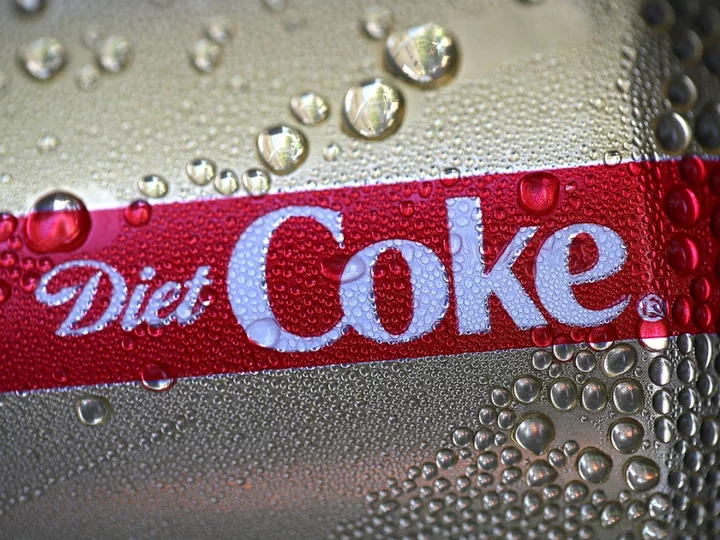
Diet Coke fanatics react to forthcoming WHO announcement on ‘possibly cancerous’ aspartame: ‘The final straw’
Fans of Diet Coke have reacted with despair at reports that the World Health Organisation (WHO) may catagorise aspartame – an artificial sweetener in the drink – a potential carcinogen. It was reported on Thursday (29 June) that the health organisation’s cancer research unit, the International Agency for Research on Cancer (IARC), is preparing to label aspartame as potentially cancerous from July. Aspartame is a low-calorie artificial sweetener that is approximately 200 times sweeter than sugar and is used in a huge number of soft drinks, including Diet Coke, Pepsi Max, Diet Irn Bru, and Sprite Zero, among others. It is also used in foods such as chewing gum, candy, breakfast cereal, frozen desserts and puddings, and gelatins. Although the IARC’s ruling on the sweetener remains confidential until July, Diet Coke fans are already wondering if they might have to give up their favourite fizzy drink. “If they interfere with Diet Coke it will be the final straw for me I’m afraid,” one person warned. Another joked they have already “drunk the Diet Coke equivalent of swimming at a superfund site” in their lifetime. “You can take away my Diet Coke when you pry it out of my cold dead hands,” a third mordantly added. “Listen, if you’re going to take away Diet Coke from us, you better be prepared for 72 per cent of women aged 25-45 to quit their jobs,” another person claimed. “That’s all I’m saying. *Cracks open third Diet Coke before noon*” Others appeared smug that they had never switched from regular full-fat Coke – which contains around 10.6g of sugar per 100ml, equating to 35g per 330ml can – to the low-sugar version. One person referred to a scene from hit series Friends that showed Chandler (Matthew Perry) shouting: “I knew it!” Another said: “I told you all that Diet Coke was just as bad as regular Coke.” The IARC is expected to make its decision over aspartame public on 14 July, the same day as the Joint WHO and Food and Agriculture Organisation’s Expert Committee on Food Additives (JECFA), which is also reviewing aspartame use this year. JECFA has said it is safe to consume aspartame within accepted daily limits since 1981. An adult weighing 60kg (132 pounds) would have to drink between 12 and 36 cans of diet soda every day to be at risk, a view widely shared by national regulators. The additives committee “conducts risk assessment, which determines the probability of a specific type of harm (eg., cancer) to occur under certain conditions and levels of exposure”. The review of aspartame comes after a study conducted by experts from the French National Institute for Health and Medical Research, and Sorbonne Paris Nord University, published on March 2022, claimed it could increase the risk of cancer in people who consume it. But previous large-scale studies on humans have not revealed similar associations. A separate study published last December found that aspartame was linked to anxiety in mice. The deputy chief scientific adviser of the UK’s Food Standards Agency, Rick Mumford, commented on reports and said: “Our view is that the safety of this sweetener has been evaluated by various Scientific Committees and it is considered safe at current permitted use levels. “The IARC report has not yet been published and, when it is, it will be examined by the JECFA, who will put together a risk assessment by the end of July. We will closely study JECFA’s report and decide whether any further actions are needed.” The Independent has contacted Coca-Cola for comment. Read More Walk this way... but not like that: How men’s walks became sexualised Colleen Ballinger: Everything we know about the ‘grooming’ allegations against YouTuber Miranda Sings Kevin Costner’s estranged wife says she’ll move out of their $145m home on one condition ‘My small rash turned out to be a parasite living in my leg after a beach trip’ Chrissy Teigen welcomes fourth child – how does surrogacy actually work? Heart disease digital check-ups for over 40s being rolled out
1970-01-01 08:00
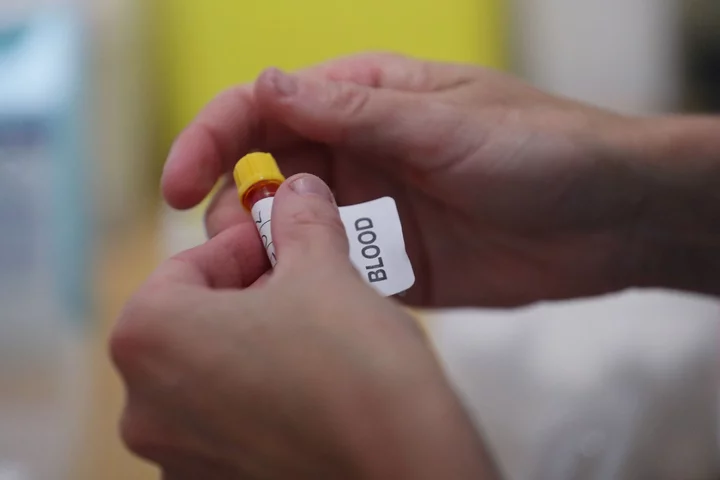
Heart disease digital check-ups for over 40s being rolled out
People over 40 in England will be sent a blood test to carry out at home in a bid to reduce heart disease and obesity. Digital NHS health checks, which will also include an online health questionnaire, will be launched next spring for people aged 40 to 74. Around 15 million people will be eligible, with around one million online checks expected to be carried out over the next four years. Health and Social Care Secretary Steve Barclay said: “Thousands of heart attacks and strokes could be prevented every year through simple health checks, which could save lives and ease pressure on the NHS. “This new digital check-up will mean people can do simple tests and get tailored advice from homes while reducing pressure on GP services.” The home blood test will check cholesterol levels with patients asked to take a blood pressure test at a pharmacy, alongside the online assessment covering details such as weight, height, diet, alcohol intake and exercise levels. Results will be made available online with help available to anyone showing early signs of issues such as diabetes or heart disease, as well as referrals to weight-loss clinics or medication. The online questionnaire will be available via phone, tablet or computer and the Government believes each check will save 20 minutes of NHS time. This could play an important role in helping people live healthier for longer and saving lives in the coming years, while reducing pressure on the NHS Professor Sir Nilesh Silemani Cardiovascular disease is the second biggest killer in England, affecting around 6.4 million people. The Government says the new digital check will help to identify 200,000 people who could benefit from the use of statins, 30,000 cases of hypertension and prevent around 400 heart attacks and strokes over the first four years. Professor Sir Nilesh Samani, medical director at the British Heart Foundation, said: “This initiative will help to reach more people and encourage them to get their blood pressure and cholesterol levels checked so that, where necessary, healthcare professionals can work with them to manage their condition. “This could play an important role in helping people live healthier for longer and saving lives in the coming years, while reducing pressure on the NHS.” Existing NHS health checks for people in the same age group take place face-to-face with a GP and concerns have been expressed that elderly people are not left behind if they struggle with technology. David Baines, vice chair of the Local Government Association, told The Times: “Making more digital health checks available is a useful tool to detect certain illnesses but it should be treated as an addition to, not a replacement for, a physical health check.”
1970-01-01 08:00
